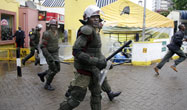Kenyans must hold rotten police force to account

‘Like most Kenyans, the chilling sight of plainclothes policemen gunning down three unarmed “gangsters” at close range and in cold blood… left my stomach turning,’ writes H. Nanjala Nyabola. ‘Is this how low we’ve sunk as a nation?'
This has not been a good week to be Kenyan. The opportunistic and short-sighted gamesmanship of our politicians, we’re unfortunately accustomed to. What has really shaken the nation to the core is the public display of the full extent of the depravity and corruption of those trusted to protect us. Like most Kenyans, the chilling sight of plainclothes policemen gunning down three unarmed ‘gangster’” at close range and in cold blood, on a major highway, in broad daylight and with legions of witnesses, left my stomach turning. What kind of person would be capable of such brutality? What kind of police force would then turn around and deny what has been so clearly captured by a vigilant passer-by? Is this how low we’ve sunk as a nation?
What really cemented my disgust was that last week two other chilling reminders of the extent of the corruption within the police force found their way to my desktop. The first is from a few months ago, when the Kenya National Commission for Human Rights (KNHCR) released a report revealing the true extent of corruption within the police force. A major part of that report was a signed statement by Constable Bernard Kiriinya, a courageous young man who bravely revealed specific incidences of brutality and excessive violence by the police, and paid for his bravery with his life. The report, available widely online, reveals the systematic use of extrajudicial killings by the Kenyan police force and its notorious death squads. Not for the fainthearted, the report reveals the extent of the rot in the police force, and lends an added chill to the images of plain clothes policemen executing three unarmed men on a major highway last week. It is sad that anyone, criminal or not would lose their life in the callous ways described in the report, it is even more saddening that one of the families in last week’s incident is claiming a case of mistaken identity.
The second was a video that also made the electronic rounds, showing a young truck driver resisting arrest by a police officer. Although the video is circulating as a joke – little man fights back - having read the KNHCR report, it is anything but funny. The young man in question loudly and then violently resists every effort by the police to have him pull over his truck, going as far as throwing a large rock at the policeman. Eventually, he gets into his truck and tries to drive away, but the policeman has enough time to call for reinforcements, and the video picks up with the young man lying on the floor, clearly having been beaten up, and the policeman arriving in an unmarked vehicle, filled with what appear to be plain clothes policemen. As in the case of the three “gangsters” journalists and passers-by recording the events are threatened by policemen and women to stop recording – it’s a testament to their courage that they refused. Watching the video, one can’t help but recall the statements of Constable Kiriinya, and wonder what happened to the young man after the cameras stopped rolling.
The Kenya Police does not have a monopoly of brutality, but has over successive regimes confirmed the lengths to which it is prepared to go in order to provide security through fear. To be sure, crime in the country is a major problem, but as one poignant editorial in the national press noted last week, the police cannot solve crime by becoming criminals themselves. Regardless of what the minster of internal security claims, suspending three police officers when the rot so clearly goes higher up the chain is not an acceptable solution. It is common knowledge that this kind of brutality, while perhaps in scale, is nothing new in the country. The Kenya Police was an integral part of the colonial repressive mechanism; routinely used to raid the homes of independence activists, round up suspected Mau Mau and their families and terrorise African and Asian communities. At independence, the security mechanism was never reformed but rather was co-opted by two regimes built on violence and fear – at the lowest moments, many Kenyans recall living in fear that their neighbours had been co-opted by security forces and were watching their every move. The Kibaki government, although less overtly repressive, seems to have taken such excesses to their logical conclusion, giving the police force carte blanche to kill criminals on sight and abandon any pretext of rule of law.
The solution clearly needs to be completely revolutionary - nothing short of a complete renewal of the police force, as recommended by the Kenya National Dialogue and Reconciliation. Sadly, with the current government expending more energy on wrangling its way out of it’s international commitments to implement that agenda, for instance gaining the support of other AU nations in it’s attempt to withdraw from the ICC where the former police chief is currently under indictment, it appears that the police will get away with it again. Perhaps the only encouragement emerging from all of this is the force of reaction of the Kenyan people; their rejection of violence in the press and in other forums, not to mention the vociferous protest of the human rights community. What we need now more than ever is citizens, especially of other AU nations, to take up the cause and call for greater accountability and justice in Kenya.
BROUGHT TO YOU BY PAMBAZUKA NEWS
* Please send comments to [email protected] or comment online at Pambazuka News.

